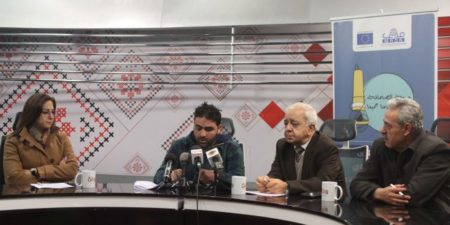The Palestinian Center for Development and Media Freedoms, “MADA”, has issued its annual report on media freedoms in Palestine, during the past year of 2019. PNN notes that this report is part of the project “A Step Forward towards Promoting Freedom of Expression in Palestine,” supported by the European Union.
This came during a press conference, held today on Watan TV, in which Dr. Ghazi Hanania, Chairman of the Board of Directors of MADA Center, Mousa Rimawi, Director General of the Center, and journalists Moath Amarneh and Christine Renawi participated.
At the beginning of the press conference, Rimawi greeted all journalists, especially Palestinian journalists who face Israeli repression, to convey the reality of what is happening on the ground. Rimawi emphasized on the rejection of the so-called “Deal of the Century,” which further paves the way for a state of apartheid and human rights violations in Palestine, including that of media and press freedoms. Rimawi again welcomed the primary efforts announced by the Palestinian government headed by Dr. Muhammad Shtayyah, which rejects the attacks and violations against journalists and against the freedoms of opinion and expression. These efforts reflected on the reality by the low number of violations in the West Bank, but the decision to block 49 sites, by the Magistrate’s Court in Ramallah, was indeed a setback to freedom of expression.
Additionally, Dr. Ghazi Hanania reviewed the results of the annual report for media freedoms in 2019, pointing to the efforts of the MADA Center in shedding light on the violations that are being practiced against these freedoms in Palestine, by the Israeli occupation authorities and Facebook, in addition to Palestinians. Hanania added that MADA Center held a meeting with Palestinian Prime Minister Dr. Muhammad Shtayyeh, to brief him on the state of media freedoms and the requirements needed from the Palestinian government.

Hanania indicated that MADA Center monitored and documented a total of 678 violations against media freedoms in Palestine; Israeli occupation forces and authorities committed a total of 297 attacks (about 44%), while social media companies committed 181 violations (27%), and various Palestinian authorities committed in the occupied West Bank and Gaza Strip—a total of 200 violations (29% of all violations)—indicating that the increase of number of violations came as a result of the violations committed by social media companies (Facebook, specifically) against Palestinian content, and the targeting of news pages and journalists’ accounts.
On the other hand, free-lance photographer Moath Amarneh thanked all those who stood in solidarity with him, from individual journalists to entire organizations, after being shot by Israeli occupation forces, which led to the loss of his eye. Amarneh stressed the need to preserve the cohesion of the press body to face the attacks of the Israeli occupation against Palestinian journalists, which intends to fight the Palestinian image and narration in all ways and tries to prevent the journalist from reporting the reality of what is happening on the ground. Moreover, Amarneh pointed out that the Israeli occupation army deals with the Palestinian journalist as an enemy on the ground and intentionally targets them. The best evidence of this is this deliberate injury caused by an Israeli sniper who shot him directly in his eye and later photographed the location of the injury, to document it. Amarneh said that this was a direct and clear message to journalists by the Israeli occupation: “A strong photograph will be the reason for your injury.”

As for Jerusalem TV reporter Christine Rinawi, she explained how that the Israeli occupation closed Palestine TV office in Jerusalem, in late 2019, and prevented journalists working there from practicing journalism for 6 months. Rinawi indicated that the decision to close the office is a political decision that falls within the systematic attacks against the city of Jerusalem. Rinawi also confirmed that the occupation deals with the journalist as part of the problem because of the strong photos they deliver and their ability to convey the truth.
She added that she had been interrogated 3 times within one day, while the staff at the Jerusalem office was prevented from continuing to present their programs in the field, where her colleagues were detained and subsequently investigated. In conclusion, Rinawi indicated that no matter how the occupation forces try to obstruct the work of the Palestinian journalist, the coverage will continue because the Palestinian journalist has a message to deliver.

